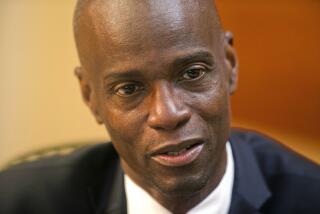2 French Officials Ousted Over Greenpeace Bombing
- Share via
PARIS — Premier Laurent Fabius, under pressure from President Francois Mitterrand, ordered the removal of the defense minister and the director of the French intelligence agency Friday in the face of persistent charges that French agents blew up the Greenpeace ship Rainbow Warrior in New Zealand two months ago.
The shake-up in the French defense and intelligence establishment represented the first punitive action taken by the government in the political scandal that has embarrassed Paris and embittered its relations with New Zealand.
There was no actual admission by the French Socialist government that it was responsible for bombing and sinking the ship. But the implication was clear: the government admitted that its defense officials were lying in claiming that their agents were assigned to do no more than gather information about Greenpeace.
After being ordered by an impatient Mitterrand to do something about the growing scandal, Fabius, in a public letter to the president, announced the departures of Defense Minister Charles Hernu and Admiral Pierre Lacoste, the director of the General Directorate of External Security, as the French intelligence agency is known.
Paul Quiles, minister of urban affairs, was quickly named to replace the 62-year-old Hernu, and Fabius said that the new defense minister will continue an investigation into the affair.
Hernu, who had insisted as recently as Wednesday that no agents were sent to New Zealand to bomb the ship, resigned, presumably at Fabius’ request. In his letter of resignation, Hernu said that “I have known for sure since Thursday night that officials of my ministry have hidden the truth from me.” Hernu did not say what that truth was.
Fabius said that the reason for Lacoste’s dismissal was his refusal, when questioned officially, to reply in writing whether, as reported in the French press, a third, unacknowledged team of French intelligence agents was in New Zealand at the time of the bombing. This team, the press reported, was made up of two French frogmen who put the two mines on the hull of the Rainbow Warrior.
Lacoste, according to Fabius, said he could not reply because of “his conception of his duties.”
Finger Points at French
Suspicion of a French hand in the bombing, which killed a Portuguese-born photographer aboard the ship, was high from the beginning, because the Rainbow Warrior, owned by the environmental organization Greenpeace, was due to lead a protest flotilla into the French nuclear testing range in Mururoa Atoll in the South Pacific.
Soon after the sinking of the Rainbow Warrior, New Zealand police arrested a French-speaking couple and charged them with complicity in murder and arson. The police also issued warrants for the arrest of three Frenchmen who had been on a sailing yacht shortly before the explosions in Auckland harbor.
In a special investigation ordered by Mitterrand, Bernard Tricot, a conservative jurist and former high-ranking bureaucrat, acknowledged that all five people arrested or sought by New Zealand were agents of the General Directorate of External Security. But he said that he accepted the word of officials of the Ministry of Defense and the directorate that the agents were sent to New Zealand to do no more than spy on Greenpeace.
Someone else, unknown, Tricot concluded, had bombed the ship.
Skeptical of Report
Tricot’s report was treated with great skepticism by the French press, and earlier this week the influential newspaper Le Monde reported that France had a third team of agents in the area which had bombed the ship. This account was confirmed by L’Express, the French weekly news magazine. Le Monde said that the operation was approved by Hernu and other top authorities.
Faced with mounting pressure from the press, Mitterrand reportedly lost patience at a Cabinet meeting Wednesday. According to Le Monde, Mitterrand turned on Hernu, an old friend, and demanded, “I want to know what is going on.”
After Hernu issued a statement that shed no new light on the affair but attacked the patriotism of those daring to impugn the honor of the French military, Mitterrand wrote a public letter to Fabius on Thursday night, demanding personnel changes in defense and intelligence.
It was clear then that Fabius would act quickly, and he did so Friday morning, announcing the departures of Hernu and Lacoste.
More to Read
Sign up for Essential California
The most important California stories and recommendations in your inbox every morning.
You may occasionally receive promotional content from the Los Angeles Times.













